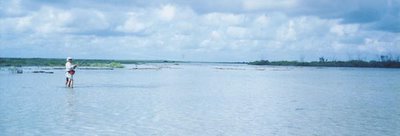The Fisherman, An Excerpt

Once upon a time in a country with palm trees and a turquoise sea, there lived a fisherman. He had not always lived by fishing, and his home had not always had palm trees surrounding it. Many years before he was a poet, employed in a city where trees lost their leaves and rivers turned to ice. This is the story of how he became a fisherman.
One day the poet awoke early. It was a Thursday like any other. He had to go to town to buy bread and onions. And he had to write a poem. A poem filled with rhymes and the sounds of howling wolves and the stillness of falling snow and images of the faint blue light cast by a frozen star. This poem he would bring to the prince on Friday and read to the Prince’s Court.
All the rich and powerful men would nod at how well he commanded the language and how clever he was. And the hearts of the beautiful and rich ladies would beat a little faster and a slight blush would come to their faces at the depth of his sensitivity and the glimpse he gave them of his passion for life.
The poet went to town and bought bread and onions. He did this because the onions symbolized the depth of earth and the surprises he lived by. And the bread symbolized the magic he loved, the yeast mysteriously turning dry flour and water to rich crusty bread. He put the onions to boil for soup and sat in his chair to write the poem.
But alas, after 2 or 3 hours of patiently waiting, no poem came to him. Had the muse of his poetry gone on vacation? Was the poet within him on strike? Had someone picked all of the poems off his poem tree while he slept? What was wrong? He had no idea what was the matter.
The poet became afraid. What would the rich and powerful men and the rich and beautiful ladies say if he had no poem? Worse yet, what of the prince who depended on his poems to inspire his guests and to impress them with beauty?
He began to think of the ice, the deep black ice of lakes, and how the geese returning in early Spring sighed disappointment when they could not land on water and wheeled in the sky slide onto the ice. He thought of the wind, sharp as a razor, and how it lashed the faces and froze the beards and brought tears to the eyes that froze like diamonds on the tips of eyelashes. He thought of the wails of wolves as they cried at the blue sun for warmth and water and green but huddled instead in their frozen holes, hungry, to wait and dream of a new season. He could not find a single poem in any of this.
Instead, his heart spoke to him of blue seas and hot suns, that somewhere, far away in a distant country, there was always fruit on the trees and no need for coats and no real need for fire or quilts or heavy woolen cloth or skins. Could he tell this poem to the prince and the Court? Would they banish him? After all, it was his charge to write a northern winter poem for a northern winter prince and a northern winter court.
Then a smile came to his face and immediately a poem appeared on the paper before him:
I stand on a white beach,
A hot sun and a turquoise sea
Filled with fish before me.
The blue sun, howls of wolves
Are a distant almost forgotten
Memory. And snow has never been
Dreamt of here.
I am a poet who can turn small
Children to sparrows. But I could
Not melt the black ice of lakes
And I could not make the frozen rivers
Flow.
But I could dream of the
Place, far away, where
There is always fruit and
Fishermen need no shoes.
When he finished reading this poem, instead of the usual applause and cheers and shouts of delight, there was a great, deep, cavernous silence. You could hear a distant clock tick.

Eventually, the prince, wearing rich ermine, rose and spoke. "These are thoughts that are forbidden in this country because they make us weaker in the face of extreme winter. The usual penalty for such speech is death. But I will spare this poet because of his many years of service, and I order him to be banished to the land he dreams of. May no further mention of this evening be made on penalty of death."
As he stood before his home on a beach with palm trees and a turquoise sea, the prince's speech was only a distant memory, as was the four month sea voyage and its many ports, each one warmer than its predecessor. A smile came to his browned face, and he laughed out loud.
From The Dream Antilles by David Seth Michaels, copyright 2005






1 Comments:
David, Have you read Italo Calvino's collection ITALIAN FOLKTALES? I enjoyed this piece. Crisp writing.
bybye
Publicar un comentario
<< Home